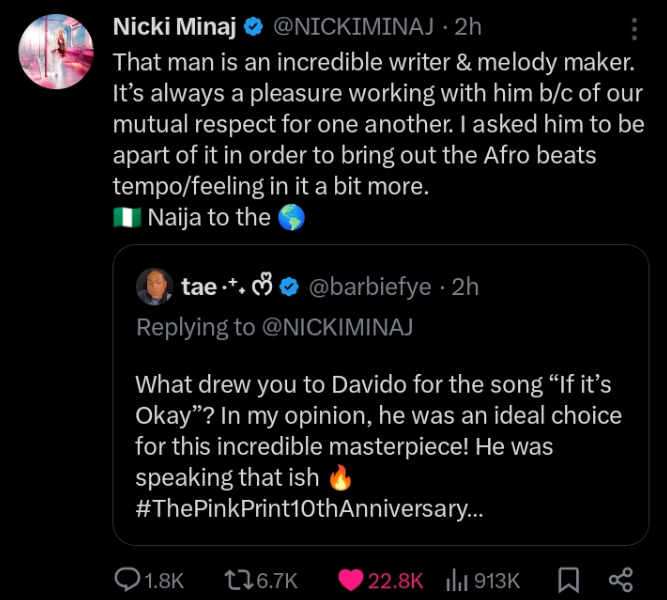Rap queen Nicki Minaj has opened up about her strategic decision to feature Nigerian Afrobeats superstar Davido on her track “If It’s Okay,” highlighting a deepening connection between mainstream American hip-hop and African musical influences.
Speaking candidly on social media platform X, Minaj shared her deliberate choice to bring Davido onto the project, emphasizing her desire to capture an authentic Afrobeats sound. The collaboration, which appears on the special 10th-anniversary edition of her groundbreaking album “The Pinkprint,” represents more than just another feature – it symbolizes a thoughtful fusion of musical cultures and a recognition of Afrobeats’ growing global influence.
The partnership between these two musical powerhouses isn’t their first venture together. Their creative synergy was previously demonstrated on “Holy Ground,” a standout track from Davido’s 2020 album “A Better Time.” This latest collaboration builds upon their established musical chemistry, showcasing both artists’ commitment to creating authentic cross-cultural musical experiences.
Minaj’s praise for Davido extended beyond his performance abilities, as she specifically highlighted his talents as a songwriter and melody creator. Her acknowledgment of these skills provides insight into why she sought him out for this particular project, suggesting a deep appreciation for his artistry that goes beyond his commercial success or star power.
The inclusion of “If It’s Okay” on the anniversary edition of “The Pinkprint” places it in distinguished company. The special release features four new tracks, with collaborations including artists like Swae Lee, David Guetta, and a poignant feature from the late Juice WRLD. This careful curation of collaborators suggests the strategic importance Minaj placed on each feature, making her choice of Davido even more significant.
The collaboration represents a broader trend in contemporary music, where genres and cultural boundaries continue to blur, creating new sonic landscapes that resonate with global audiences. Minaj’s decision to incorporate authentic Afrobeats elements through Davido’s participation demonstrates an understanding of the genre’s importance and its growing influence on international music scenes.
This musical partnership also highlights the evolving relationship between American hip-hop and African music. By actively seeking to capture the genuine essence of Afrobeats, Minaj shows respect for the genre’s origins while helping to showcase Nigerian music to her global audience. This approach stands in contrast to surface-level adaptations of African sounds, instead pursuing authentic cultural exchange through musical collaboration.
The timing of this release is particularly significant, coming at a moment when Afrobeats is experiencing unprecedented global recognition. Davido, as one of the genre’s most prominent ambassadors, brings not just his musical talent to the collaboration but also his deep understanding of the sound’s cultural roots and its contemporary evolution.
Through her candid discussion of the collaboration, Minaj has also shed light on the thoughtful process behind major musical partnerships in today’s interconnected industry. Her emphasis on mutual respect and artistic appreciation suggests a move away from purely commercial considerations toward more culturally meaningful collaborations.
The special anniversary edition of “The Pinkprint” serves as both a celebration of Minaj’s impact on hip-hop and a forward-looking statement about the genre’s future directions. By including this collaboration with Davido, Minaj not only acknowledges the global reach of contemporary music but also actively participates in shaping its evolution.
As the music industry continues to evolve, collaborations like “If It’s Okay” represent more than just new songs – they serve as cultural bridges, creating connections between different musical traditions while respecting their unique characteristics. This partnership between Minaj and Davido stands as a testament to the power of thoughtful collaboration in creating music that resonates across cultural boundaries while maintaining its authentic roots.
The success of this collaboration could well pave the way for more such partnerships, encouraging other artists to seek out genuine cultural exchanges in their musical endeavors. As Afrobeats continues to gain global prominence, this collaboration serves as a blueprint for how international artists can respectfully and effectively incorporate its influences while championing its authentic practitioners.



